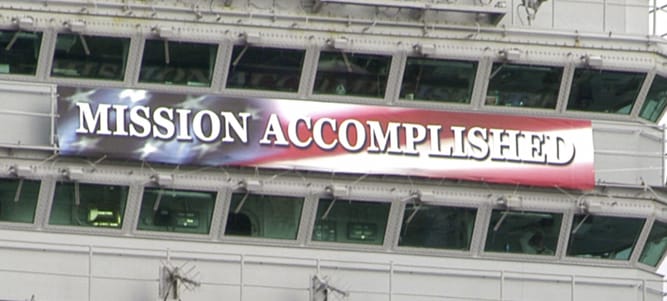gaffe

A “gaffe” is the opposite of a “lie”; it’s when a politician inadvertently tells the truth.
—Michael Kinsley, 1984
A gaffe is a mistake, a blunder, especially a social faux pas or a verbal error made by a politician. The word is a borrowing from the French in the nineteenth century, but its English use may been influenced by a Scots word as well as by a Vaudeville method of removing a floundering performer from the stage. So the origin is a bit more complex than a straightforward borrowing.
The French gaffe can mean both a mistake and a pole with a hook or barb at the end, and English borrowed both of these senses, although the English gaff or hook is a much earlier borrowing, from the thirteenth century.
The earliest use of the mistake sense of gaffe in English that I’m aware of is in a 27 May 1883 letter by Mary King Waddington. She was the American wife of a French diplomat and former prime minister, and her letter describes the events at the coronation of Tsar Alexander III. She is thus a direct conduit from French into English, and her use of quotation marks indicates that she thought the word would be unusual to an anglophone reader, although the meaning is clear from the context:
They told us that when the Emperor raised his glass and asked for wine that was the signal for us to retire; and that it would be after the roast. (All our instructions were most carefully given to us by Benckendorff, who felt his responsibility.) Think what his position would have been if any member of his Embassy had made a “gaffe.”
While French is clearly the proximate source of the English word, the adoption of gaffe was probably aided by two other senses. The Scots gawf or gaff started out as an echoic word for a loud laugh, giving us the English guffaw. The Scots word came to mean to chatter or talk boisterously, by the beginning of the nineteenth century, and as it worked its way into English slang in the mid century came also to mean rumor or humbug. The phrase to blow the gaff meant to reveal a secret or rat out a fellow conspirator.
Another influence is that of the hook sense of gaff and comes out of vaudeville. Around the turn of the twentieth century it was an occasional practice on the Vaudeville circuit to remove an act that was bombing by using a giant hook to yank the performer from the stage. The practice went on to become a staple gag in early television comedies, so it’s familiar to later generations. While not the origin of the word gaffe, the metaphor may have helped boost its present-day use.
Sources:
Dictionary of the Older Scottish Tongue, 1951, s.v. gawf(e, gaff, n. Dictionaries of the Scots Language | Dictionars o the Scots Leid (DSL).
Kinsley, Michael. “Mondale Tries Demagoguery on Mortgage Interest Issue.” Los Angeles Times, 15 May 1984, C5/4. ProQuest Historical Newspapers.
Green’s Dictionary of Slang, accessed 9 August 2025, s.v. gaff, n.2.
Oxford English Dictionary Online, 1933, s.v. gaffe, n.; 1900, s.v. guffaw, n., guffaw, v.; 1898, s.v. gaff, n.1, gaff, n.2.
Scottish National Dictionary, 1956, s.v. gaff, n., v. Dictionaries of the Scots Language | Dictionars o the Scots Leid (DSL).
Waddington, Mary King. Letter, 27 May 1883. Letters of a Diplomat’s Wife, 1883–1900. New York: Charles Scribner’s Sons, 1903, 69–70. HathiTrust Digital Library.
Photo credit: Juan E. Diaz / US Navy, 2003. Wikimedia Commons. Public domain photo.